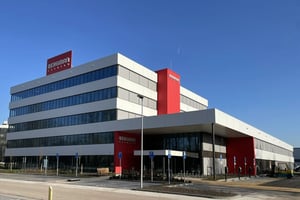Several NPM portfolio companies are members of Katakle, a group of investors dedicated to ending hunger in the West African nation of Benin. Katakle was established by The Hunger Project (THP) in 2008, in association with NPM Capital and Carel van Bemmelen. In this issue of Capital Update, the latter and Evelijne Bruning, Director for THP Netherlands, look ahead to the scheduled termination of the project in 2018 and reflect on the impressive results achieved to date.
Can you give us an update on The Hunger Project?
Bruning: ‘Things are going really well. The organisation has been growing steadily and the various programmes we’re running have all been extremely successful – thanks in no small part to Katakle and NPM Capital, I should add. I like to tell people that NPM Capital has challenged us to think big, and we continue to reap the benefits of that mentality today. I’m particularly proud of the fact that THP was the runner-up for PwC’s Transparant Prijs (Transparency Award) this year. It’s an award presented to socially relevant organisations that clearly communicate their ethos and values and the impact of their initiatives in their public reports. For the past three years, we have also been ranked among the charities in the Netherlands that have the highest impact for each euro donated. We feel this is proof positive that our approach really makes a difference.’
Katakle currently has around 60 members, including private companies, members of the public and various foundations and associations. Is it difficult to motivate people to join your project?
Van Bemmelen: ‘Not really, no. For one, the financial commitment involved is relatively small, and then there’s the fact that we focus on supporting people in their development, so they can take charge of their future. The latter tends to appeal to good entrepreneurs, since they’re essentially trying to achieve the same thing within their organisations: encouraging people to take personal responsibility, be proactive, and make decisions.’
Bruning: ‘I would also like to add that Katakle has grown into a thriving network that’s an inspiration to a lot of people. Our members hold regular meetings in which they give each other updates, often hosted at one of the members’ companies. We also travel to Benin with a group of stakeholders on a regular basis, and they provide feedback on their experiences. It’s basically evolved into a type of community, which is a big part of why it continues to grow and flourish.’
Have you achieved your stated objective of permanently freeing at least 10 percent of the rural population from hunger by promoting entrepreneurship and self-sufficiency in these communities?
Van Bemmelen: ‘From what I’ve gathered on my frequent trips to Benin, I would estimate that we will indeed meet that target in 2018. We are currently working directly with more than 300,000 people in a total of eighteen rural communities. By the end of this year, our work will be completed in the first three of these communities, as they have now achieved self-sufficiency. This means there are no longer food shortages, sanitation has improved, children are attending school, and people are starting their own small businesses and managing their own projects. We can say that the infrastructure is now essentially in place to enable these people to develop further, not just in the immediate future but in the long run as well.
So when the project winds to a close in two years’ time, we’ll definitely have something to celebrate.’
Why did you set the target of 10 percent? Why not 100 percent?
Van Bemmelen: ‘Well, we assume that 10 percent will become a type of tipping point, as it were. Once we’ve achieved that goal, we will have the critical mass needed for the effects to ripple out and spread elsewhere. I was talking to a local doctor who runs a total of 30 medical centres, including two located in the villages where The Hunger Project is active. He was so impressed by the results achieved in our clinics that he has now replicated our approach in his 28 other centres. Of course, you can’t expect the entire population of a community of 20,000 to be developed to the same degree. Inevitably, some people will be more talented and motivated than others, but then that’s true wherever you go.’
But it’s also true that it is human nature to want to improve your situation if you see others around you doing well. And don’t forget the power of leading by example. Like I said, I travel to Benin regularly, and it really makes me happy to see how things have improved for people there compared to five years ago. There’s loads of new activity everywhere, people are working their land and sending their children to school. The process is not yet completed but the wheels are definitely turning – something unstoppable has been set in motion.’
What would you say are some of the key success factors for these types of programmes?
Bruning: ‘Before anything else, you need a stable political climate in which a number of basic human rights are respected, such as gender equality and the freedom to choose your own system of governance.
You also need leadership at the local level. The essence of our work is finding those leaders within the local community and then training and supporting them so we can work with them and their local governments in addressing their problems.’
Van Bemmelen: ‘That’s actually a crucial part of it. These types of projects always start out on a small scale, and during the first eighteen months there doesn’t seem to be much going on, other than getting people to take action. But make no mistake about it: that’s very important, as it’s during this stage that you see if people are willing to embrace change. You need to have that certainty before you can start making fundamental changes. So that preparation time is essential, but organisations tend to forget that “It starts with the mind, not the money”’.
Would you say this also applies to the members of Katakle?
Van Bemmelen: ‘Absolutely. I think something all our members have in common is that they enjoy figuring out together whether a specific approach to self-development is viable. In that sense, it’s more about the experiment than about the money. Having said that, no company wants to waste money on useless projects, so we told people right from the outset that we needed to develop a straightforward set of KPIs which we would regularly share with all the other members, so everyone would be able to track progress. And that’s exactly what we’ve been doing.’
Bruning: ‘Apart from the corporate visits and the trips to Benin, I would consider the annual Run for the Hunger Project another highlight in terms of people’s level of commitment. Last year, the 100 participating Business Teams raised nearly 200,000 euros through this event. That’s really something to be proud of, as well as a clear sign that our investors really feel they’re part of our project.’
For more information on the tenth edition of the Run for the Hunger Project on 6 November 2016, please visit http://www.runforthehungerproject.nl/29-wat-is-het.html. It’s not too late to sign up!



.jpg?width=448&height=200&name=cybersecurity-privacy-protect-data%20(1).jpg)









